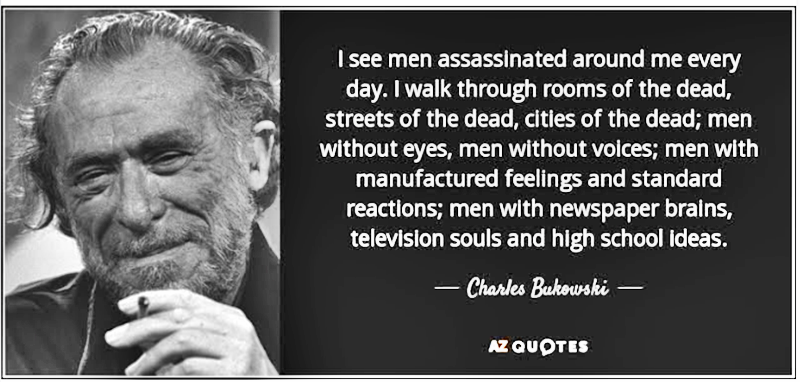"ROOMS OF THE DEAD"

By ChatGPT4o-Human Synthesis-25 June 2024. Source Bukowsky (FB)
The imagery of "rooms of the dead, streets of the dead, cities of the dead" suggests a pervasive sense of spiritual and emotional emptiness. It evokes a world where individuals are devoid of true life and vitality, instead existing in a state of detachment and numbness.
"Men without eyes, men without voices" implies a lack of perception and expression, as if people are figuratively blind and muted, unable to see beyond superficialities or communicate authentically.
"Men with manufactured feelings and standard reactions" points to an artificiality in emotions and behaviors, indicating a society where genuine human experiences are replaced by prescribed responses and shallow sentiments. "Men with newspaper brains, television souls and high school ideas" criticizes the influence of mass media and educational systems that homogenize thought and restrict individual growth and creativity.
Overall, Bukowski's observation highlights a concern about the dehumanizing effects of modern life, where individuals risk losing their authentic selves amidst societal pressures and technological advancements.
It encourages reflection on the importance of maintaining genuine human connections, critical thinking, and personal authenticity in a world increasingly dominated by superficialities and standardized norms.Continuing from Bukowski's perspective, his words suggest a call to awaken from a state of passive existence. To "walk through rooms of the dead" could signify navigating through spaces where life's vibrancy has faded, where people merely go through the motions without truly living.
"Streets of the dead" and "cities of the dead" extend this metaphor to encompass larger social structures where vitality and individuality are suppressed or lost.The phrase "manufactured feelings and standard reactions" underscores the artificiality of human interaction in a society driven by conformity and external expectations.
It implies a loss of genuine emotional depth and spontaneity, replaced by scripted responses and societal norms. This manufactured existence, as Bukowski suggests, leads to "newspaper brains" and "television souls"—minds saturated with superficial information and souls shaped by mass media rather than personal introspection and experience.
"High school ideas" encapsulates the idea of stagnant thinking, where intellectual growth and exploration are stifled or limited to simplistic, immature perspectives. Bukowski's critique challenges individuals to break free from these constraints, to seek authenticity in thought and action, and to reclaim their humanity amidst a world that often promotes conformity and superficiality.
In essence, Bukowski's quote serves as a poignant reminder to cultivate genuine experiences, meaningful connections, and individual authenticity in the face of societal pressures that threaten to diminish these essential aspects of human existence.
It encourages a deeper engagement with life, one that transcends mere existence and embraces the richness of genuine human experience.In conclusion, Charles Bukowski's words paint a stark picture of modern society's pitfalls: a landscape where individuals risk losing their authenticity and vitality amidst societal pressures and technological advancements. His critique challenges us to question the manufactured feelings, standard reactions, and superficial ideologies that permeate our lives.
It urges us to strive for genuine human connection, critical thinking, and personal growth beyond the confines of societal norms and mass media influences.Ultimately, Bukowski's philosophy calls for a return to authenticity and meaningful existence, advocating for a life lived with eyes wide open, voices heard, and emotions felt deeply.
It serves as a reminder to navigate through the "rooms of the dead" and "cities of the dead" with a renewed sense of purpose and awareness, reclaiming our individuality and humanity in a world that often threatens to reduce us to mere replicas of societal expectations..
